#Soviet-Russian composer
Explore tagged Tumblr posts
Text
youtube
Sofiya Gubaidúlina (b.1931) : Viola Concerto (1996)
Performers: -Lawrence Power, viola (Antonio Brensi, Bologna, c.1590) -
Ivan Volkov, conductor -
Orquestra Simfònica de Barcelona i Nacional de Catalunya
4 notes
·
View notes
Text
Shostakovich-Sollertinsky letter translations (Russian to English)
So, I finally finished formatting my translations of the Shostakovich-Sollertinsky letters from a few years ago! These are letters from Shostakovich to his close friend, the polymath and scholar Ivan Ivanovich Sollertinsky, from the late 1920s to 1943. They offer valuable insight on Shostakovich's opinions on subjects such as music, his personal life, and current events of the day.
The letters have been published in Russian and have also been translated and published in German; an official English translation does not exist as of posting this. I'm not a fluent Russian speaker and much of this was done with the help of a dictionary and the internet, but I believe I compiled a decent enough translation. I kinda had to rush the formatting towards the end, but it should be readable enough. Anyway, if anyone is interested, here it is!
For any Russian speakers who want to review my translations or would like to read the original letters, here is the PDF of the book.
#shostakovich#dmitri shostakovich#classical music#composers#classical composers#music history#classical music history#soviet history#soviet music history#translation#russian to english translation#russian history
28 notes
·
View notes
Text
This was originally a request from a friend but I figured I might as well post here coz I think it’s too funny
Audio: Berlioz, Symphonie Fantastique Mvt. 4. March to the Scaffold
Would highly recommend listening to the whole track coz it’s a banger but also it’s literally the composer having an opium-induced fever dream about him getting his head lopped off at the guillotine so
#genshin impact#focalors#neuvillette#I’m not sorry#this whole thing spawned from me ranting about Fontaine’s OST for like the nth time#for context I’m a classical musician and while I don’t think Fontaine’s music is necessarily bad#and I get what Hoyomix was aiming for#the direction they chose just frustrates me so much that I could probably scream about it for a good ten minutes or so#again not saying Hoyomix is bad I love their stuff too it just#FRSUTRATES ME#that the nation primarily inspired by what I’m assuming is Belle epoque France#fails to capitalise off of using French romantic composers from the era#and yes I know they said they’ve used Saint-Saëns#Ravel and Faure but I can’t hear it outside of the original Travail motif which was repurposed to just Arlecchino’s#and no imitation compositional technique isn’t making it super obvious either#but somehow we get a lot of Russian and Soviet composers#and I LOVE their stuff#but I was expecting Shostakovich and Stravinsky for SNEZHNAYA NOT FONTAINE#and also Khachaturian while we’re at it#SERIOUSLY WHY IS THERE A SUPER STRAVINSKY SOUNDNING TRACK IN SOME FRENCH CAVES#for reference the track is Magick Without Tears#I mean if we got Chopin at least question mark#but the dude is still Polish and famously homesick despite living in France#but seriously how did we get fricking Le Mer referenced in INAZUMA BUT NOT FONTAINE#no track names alluding to Debussy’s famous works don’t count either we could’ve had La Cathedral Engloutie underwater or something likE#IMAGINE#*cathedrale oops#and don’t get me started on how one of the few references I can find to French Impressionism is just Satie’s gymnopedie#and they named it Gymnopedie too LIKE#or any reference in the OST to the operas in Furina’s constellations like those are som serious bangers
12 notes
·
View notes
Text
Brought to tears by a Shostakovich string quartet yet again
#shostakovich#classical music#string instruments#string quartet#western art music#western art#russian composers#russian music#soviet music#Soviet composer#mine
9 notes
·
View notes
Text
youtube
Tchaikovsky Symphony No 7 (by Tchaikovsky Foundation with Pyotr Klimov)
Pyotr Ilyich Tchaikovsky's Symphony in E-flat, was commenced after Symphony No. 5, and was intended to be his Sixth Symphony. Tchaikovsky abandoned this work in 1892, only to reuse the first movement in the single-movement Third Piano Concerto, Op. 75, first performed and published after his death in 1895. A reconstruction of the original symphony from the sketches and various reworkings was accomplished during 1951–1955 by Soviet composer Semyon Bogatyrev, who brought the symphony into finished, fully orchestrated form and issued the score as Tchaikovsky's "Symphony No 7 in E-flat major". In 2005, a second reconstruction of the symphony, commissioned by the Tchaikovsky Fund, was completed by Russian composer Pyotr Klimov. It had its first public performance at the Tchaikovsky State House-Museum in Klin, near Moscow, by Symphony Orchestra of Russia led by conductor Tomomi Nishimoto 西本智実, on June 5, 2006, as shown in this video.
00:20 First Movement: Allegro brilliante 13:19 2st Movement: Andante 23:20 3rd Movement: Final Allegro Maestoso 36:30 Tchaikovsky:Andante Cantabile (encore)
#tchaikovsky#pyotr ilych tchaikovsky#1840-1893 russian composer#pyotr klimov#pyotr alexandrovich klimov /b. 1970 russian composer#西本智實#にしもと ともみ#nishimoto tomomi#b.1970 japanese female conductor#semyon bogatyrev#1890-1960 soviet / russian musicologist & composer#tchaikovsky foundation#symphony orchestra of russia#symphony no 7 in E-flat major#Youtube
4 notes
·
View notes
Text
there are quite a few youtube videos of shostakovich's second waltz set to various pictures/paintings of the russian royal family and their balls and like... do the people who make these videos know? i'm just wondering
#im just saying... he was very much not a composer when russia was officially an empire...#please don't tie his music to images of the russian empire#he wasnt exactly pleased with the soviet government many times but that does not mean hed enjoy the fucking russian royal family
3 notes
·
View notes
Text
Popular Christmas song "Carol of the Bells" is based on a Ukrainian song called "Shchedryk" and was originally arranged by Ukrainian composer Mykola Leontovych. In 1921 undercover soviet state agent asked to stay the night at composer's' family home. In the morning he killed Mykola Leontovych and robbed his family.
"Shchedryk" was created while Mykola Leontovych was staying in Pokrovsk, city the russians are desperately trying to capture and are turning into ruins right now:




#ukraine#ukrainian music#ukrainian art#art#music#carol of the bells#Christmas#culture#ukrainian culture#fuck russia#russia#russia is a terrorist state#russian culture#history#genocide#stand with ukraine#russian war crimes#support ukraine#genocide of ukrainians#important
866 notes
·
View notes
Text
Seen an interesting thing:
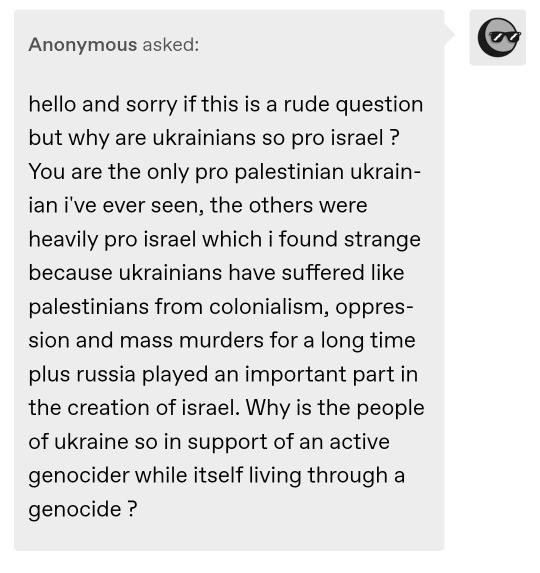
It's not really clear what anon means by "pro-israel". "Hating on Arabs/Muslims" or "Hating on genocide of Jews"? Let me remind you,
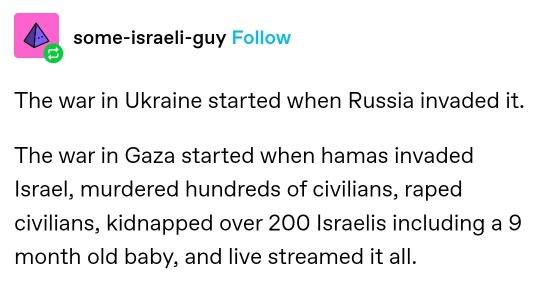
Ukraine is historically the land where Jews could live peacefully until the notorious russian empress Catherine the Second put the Sedentary Band on Ukraine, Belarus and Lithuania. That meant that Jews were deported from villages to cities, the Jews had to take russian-like surnames and names in order not to be arrested or killed - and then, russia organized pogroms all over those cities, including Vilnius, Kyiv, Miensk and Odesa. Jews could not leave the Sedentary Band without being arrested and/or killed. Russia put all sorts of bans and restrictions on Jewish traders, too. As you can see, the soviet union idea has much deeper roots than it seems.
That's why, after the Sedentary Band was cancelled, a large amount of Jews fled away: some to Poland, some to America, some to russia, some to Palestine. In russia, which is originally the biggest antisemit, life sucked pretty much, enough for many already russian-speaking Jews leaving it later and once again migrating to Poland, America, Palestine, etc. So technically, russia, as the biggest sponsor of Hamas, is at fault for both murders of Jews by Islamists and Jewish "occupation" of Palestine, lol.
After soviet pogroms, Holocaust happened, which was followed by even more soviet pogroms, actively financed by russia (go read about Lithuanian Jewish actor Andrei Mironov or Ukrainian composer Isaac Iosifovich Schwartz) - and unfortunately, some Ukrainians actively participated in killing Jews. After Ukraine has gained its independence from russia in 1991, we made sure that Ukrainians will never forget the misery, grief and pain which was brought upon Jews, both by Nazi, communists and just Ukrainian antisemitic collaborants. When I was a kid, every year, we had excursions to Babyn Yar museum - the place where hundreds of hundreds of Jews, including kids and their moms, were brutally murdered.
Ukrainians are "pro-Israel" because we understand what it's like, to be genocided, to be victim-blaimed, when the whole world turns its back on you just because your enemy is richer and more popular. Ukrainians don't hate Muslims or Palestinians - Ukrainians are disgusted by mass murders and rapes Hamas brought upon the Jews and Druzes and random tourists, some Ukrainians actually were killed on October 7, too. Ukrainians know what "Never Again" means. Ukrainians hate rapists and murderers. That's why we are "pro-Israel", бо інакше це треба бути повним дебілом (although it's much more correct to say we are "pro-Jews" since most of us is totally unaware of whatever happens in Israeli government). Despite understanding the anger of those Palestinians, who have to live through war and lose their loved ones because of their idiotic Hamas, we, as a currently genocided nation, actively support the right of Israel to strike its rapist and mass murderer back. We are also thankful to Israel for seriously damaging Iran's production of "shaheds" which kill Ukrainians almost every day.
The idea itself that Ukrainians support Israel because some Israeli happen to know russian language is insane and sounds like a conspiracy theory. Those Ukrainians who believe that "evil zionists are committing genocide" are just either chronically online or those, who didn't study school history properly, or those with prorussian mentality, or ✨️businessmen✨️. Or all of these together. Which is not a lot of people, thanks God. Hope this helps.
268 notes
·
View notes
Text

Soviet Russian composer, pianist, songwriter Aleksandra Pakhmutova - born on November 9, 1929
200 notes
·
View notes
Text
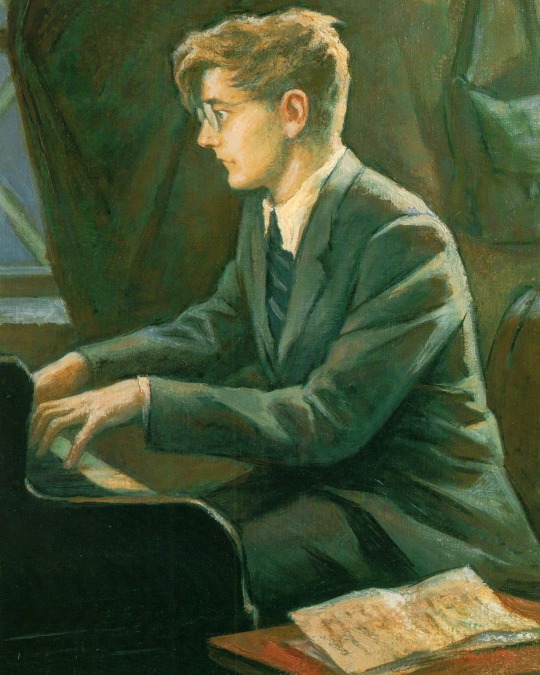
Above is a portrait of Dmitri Shostakovich painted by a friend of his and famous artist, Nikolai Sokolov.
Sokolov was among the many people Shostakovich knew aboard the infamous “Railcar No. 7”, which evacuated some of the Soviet Union’s greatest composers, musicians, artists, and dancers out of Moscow in October of 1941. For six days, an uncomfortable amount of people were packed into the railway car, which moved painfully slowly eastward across the Russian countryside away from the advancing Wehrmacht. During the night, the men would stand and let the women and children sleep. During the day, they would switch, and let the men sleep. This was life aboard their carriage.
At one point, after they’d left the station in Moscow, Shostakovich realized that two of his family’s bags were missing, including all of his clothing and his children’s clothing. Not only that, but a certain third bundle was also missing: the unfinished manuscript for his seventh symphony. While those around him, including his friend Sokolov, managed to spare some clothing for him and his children, they couldn’t quite as easily replace the manuscript. Forlorn, Shostakovich had no choice but to wait on the carriage until they reached their intended destination of Kuibyshev (now known as Samara).
It’s almost a miracle that the Shostakovich family didn’t depart the train sooner like many of those on board had, because on the fourth day, while taking a trip to the toilet, Shostakovich and his wife Nina discovered a familiar looking blanket in a puddle on the floor. Upon unwrapping it, they discovered the manuscript for Shostakovich’s seventh symphony, almost completely untouched despite the conditions in which it was found (they didn’t keep the blanket). Their suitcases, on the other hand, were never found, and were believed to have been left behind on the platform in Moscow during the chaos of evacuation.
That bundle of music would become the most famous piece of music to be composed during the Second World War, and would launch Dmitri Shostakovich into global fame. How incredibly lucky for Shostakovich that the bundle wasn’t thrown out before he had a chance to recover it, or else the world may have never heard his Symphony No. 7.
#dmitri shostakovich#shostakovich#classical music#history#music#soviet union#ussr#russia#second world war#moscow#trains
137 notes
·
View notes
Text
youtube
Aleksandra Pakhmutova (b.1929) - Concerto for Trumpet and Orchestra in E-Flat Minor ·
Timofei Dokschitzer · Aleksander Lazarev · Bolshoi Theatre Orchestra
1 note
·
View note
Text
Okay I Could do work but instead I'm going to write about the time shostakovich had the worst time in america
(So, despite the clickbaity title, this will be more of a serious post. I wrote about the topic a few years ago on Reddit , and I'll be citing a lot of the same sources as I cited there, because there are some good ones, along with some new information I've gathered over the years. This was going to be a video essay on my youtube channel, but I sort of kept putting it off.)
The Scientific and Cultural Congress for World Peace, held in New York in 1949, is a particularly fascinating event to study when it comes to researching Shostakovich because of just how divisive it was. True, the event itself, which only lasted a few days, doesn’t get as much spotlight as the Lady Macbeth scandal or the posthumous “Shostakovich Wars,” but you’ll find that when reading about the Peace Conference, as I’ll be referring to it here for the sake of brevity, many of the primary accounts of it never quite tell the full story. The Peace Conference was held during a volatile time, both in Soviet and American politics, as Cold War tensions were on the rise and an ideological debate between capitalism and communism gradually extended to become the focus of seemingly every factor of life- not just politics and economics, but also the sciences, culture, and the arts.
While artists on both sides were frequently cast in different roles in order to create or destroy the image of Soviet or American cultural and ideological superiority, the image either government sought to cast was sometimes contradictory with the sentiments of the artists themselves. For instance, while the CIA-founded Congress of Cultural Freedom (CCF) sent African American jazz musician Louis Armstrong on various tours around the world to promote jazz as American culture and dispel perceptions of racism in America, Armstrong canceled a trip to the Soviet Union in order to protest the use of armed guards against the integration of Black students at Central High School in Little Rock, Arkansas, in 1957. Meanwhile, the Soviet government’s use of international diplomatic missions by artists as cultural warfare also reflected a desire to portray themselves as the dominant culture, despite the tensions and complications that existed for artists at home. When the Soviet Union sent Dmitri Shostakovich to New York in March 1949 for the Peace Conference, such cultural contradictions are why the conference occurred the way it did, and why Shostakovich’s image has received so much controversy, both in Russia and in the west.
If you’re familiar with Soviet history, you may be familiar with the term Zhdanovshchina, which refers to a period of time between 1946 and 1948 in which Andrei Zhdanov, the Central Committee Secretary of the Soviet Union, headed a number of denunciations against prominent figures in the arts and sciences. Among musicians, Shostakovich was one of the most heavily attacked, likely due to his cultural standing, with many of his pieces censored and referred to as “formalist,” along with his expulsion from his teaching positions at the Moscow and Leningrad conservatories. During this time, Shostakovich often resorted to writing film and ideological music in order to make an income.
Meanwhile, in the United States, as fears of nuclear war began accumulating, peace movements between the two superpowers were regarded more and more as pro-Communist, an opinion backed by the House Committee of Un-American Activities (HUAC). The Waldorf-Astoria Peace Conference, to be held from March 25-27th 1949, was organized by the National Council of Arts, Sciences, and Professions, a progressive American organization, and was to feature speeches held by representatives of both American and Soviet science and culture. Harlow Shapely, one of the conference’s organizers, stated that he intended for the conference to be “non-partisan” and focused on American and Soviet cooperation.
On the 16th of February, 1949, Shostakovich was chosen to be one of the six Soviet delegates to speak at the conference. This was largely due to his fame in the west, where both his Seventh and Eighth Symphonies met a mostly positive reception. Shostakovich initially did not want to go to the conference, stating in a letter to the Agitprop leader Leonid Ilichev that he was suffering from poor health at the time and wasn’t feeling up to international travel and performances. He also said that if he were to go, he wanted his wife Nina to be able to accompany him, but he ended up being sent to New York without any members of his family- perhaps to quell concerns of defection (recall the amount of artists who defected around the time of the 1917 revolution, including notable names such as Rachmaninov and Heifetz).
Stalin famously called Shostakovich on the phone that same day to address the conference, and again, Shostakovich told him he couldn’t go, as he was feeling unwell. Sofia Khentova’s biography even states that Shostakovich actually did undergo medical examinations and was found to be sick at the time, but Stalin's personal secretary refused to relay this information. Shostakovich's close friend Yuri Levitin recalls that when Stalin called Shostakovich on the phone to ask him to go to the conference (despite the fact he had been chosen to go in advance), Shostakovich offered two reasons as to why he couldn't go- in addition to his health, Levitin claims that Shostakovich also cited the fact that his works were currently banned in the Soviet Union due to the Zhdanov decree, and that he could not represent the USSR to the west if his works were banned. While accounts of the phone call vary, the ban on Shostakovich's works was indeed lifted by the time he went to New York for the conference.
When Shostakovich arrived in New York, general anti-Communist sentiment from both Americans and Soviet expatriates, as well as media excitement, resulted in a series of protests in front of the Waldorf Astoria hotel where the conference was to be held, with some of the protesters directly referencing Shostakovich himself, as he was the most well-known Soviet delegate on the trip. In 1942, Shostakovich's 7th ("Leningrad") Symphony was performed in the United States under Toscanini and the NBC Symphony Orchestra to high acclaim, helping to promote the idea of allyship with the Soviet Union in the US during the war, and Americans were aware of the Zhdanov denunciations in 1948, as well as the previous denunciations that Shostakovich had suffered in 1936 as a result of the scandal surrounding his opera "Lady Macbeth of the Mtsensk District." So by 1949, many people in American artistic circles had a sympathetic, if not completely understanding, view of Shostakovich during the birth of the Cold War. They viewed him as a victim of Communism and the Soviet state, who was forced to appease it in order to stay in favor, and as a result, could potentially voice his dissent with the system once in the west. Pickets visible in footage from the protests outside the Waldorf Astoria carried slogans such as "Shostakovich, jump thru [sic] the window," a likely reference to Oksana Kosyankina, a Soviet schoolteacher who had reportedly jumped out of a window in protest (although the details of this story would be found to be highly dubious). Meanwhile, another sign read "Shostakovich, we understand!," a statement that would prove to be deeply ironic. At the conference itself, Shostakovich did not jump through the window, nor did he attempt any form of dissent. Instead, an interpreter read through a prepared speech as he sat on stage in front of a crowd of about 800. The speech praised Soviet music, denounced American "warmongering," and claimed that Shostakovich had accepted the criticism of 1948, saying it "brought his music forward." Many in the audience could see that Shostakovich was visibly nervous- he was "painfully ill at ease," and Nicholas Nabokov (brother of the writer Vladimir Nabokov) remarked that he looked like a "trapped man." Arthur Miller recalled he appeared "so scared." As they noticed how nervous he looked, some of those in attendance sought to make a demonstration of him in order to illustrate Soviet oppression in contrast to the freedoms supposedly enjoyed by American artists, asking him intentionally provocative questions that they knew he would not be able to answer truthfully. From Nicholas Nabokov:
After his speech I felt I had to ask him publicly a few questions. I had to do it, not in order to embarrass a wretched human being who had just given me the most flagrant example of what it is to be a composer in the Soviet Union, but because of the several thousand people that sat in the hall, because of those that perhaps still could not or did not wish to understand the sinister game that was being played before their eyes. I asked him simple factual questions concerning modern music, questions that should be of interest to all musicians. I asked him whether he, personally, the composer Shostakovich, not the delegate of Stalin’s Government, subscribed to the wholesale condemnation of Western music as it had been expounded daily by the Soviet Press and as it appeared in the official pronouncements of the Soviet Government. I asked him whether he, personally, agreed with the condemnation of the music of Stravinsky, Schoenberg, and Hindemith. To these questions he acquiesced: ‘Yes,’ he said, ‘I completely subscribe to the views as expressed by … etc….’ When he finished answering my questions the dupes in the audience gave him a new and prolonged ovation.
During the discussion panel on March 26th, music critic Olin Downes delivered yet another provocative statement towards Shostakovich:
I found both of your works [the 7th and 8th Symphonies] too long, and I strongly suspected in them the presence of a subversive influence—that of the music of Gustav Mahler.
For Shostakovich, and anyone knowledgeable of Soviet politics and music at the time, it's not hard to see why Downes had explicitly mentioned Mahler. Gustav Mahler (1860-1911) was a highly influential composer when it came to 20th century western music, particularly with regards to the avant-garde movement pioneered by the Second Viennese School- Arnold Schoenberg, Anton Webern, and Alban Berg. Shostakovich was also heavily influenced by Mahler, but such influences were frowned upon in the mid-30s to 50s Soviet Union. Mahler's style was decidedly more "western," and it's potentially for this reason that Shostakovich's 4th Symphony- perhaps his most "Mahlerian," was withdrawn from performance before its premiere in 1936, having followed the "Lady Macbeth" denunciations. To tie Shostakovich to Mahler would be to point out his direct western influences, while he was being made to issue statements that rejected them. During his speech, Shostakovich made statements criticizing Stravinsky and Prokofiev- two composers who had emigrated and adopted western-inspired neoclassical styles (although Prokofiev returned to the Soviet Union in 1936). Stravinsky had taken insult to Shostakovich's comments against him, and carried an animosity towards Shostakovich that appeared once again in their meeting in 1962, according to the composer Karen Khachaturian.
On the last day of the conference, March 27th, Shostakovich performed the second movement of his Fifth Symphony on piano at Madison Square Garden to an audience of about 18,000, and had received a massive ovation, as well as a declaration of friendship signed by American composers such as Bernstein, Copland, Koussevitzky, and Ormandy. He returned to the Soviet Union on April 3.
In addition to the 1948 denunciations, in which Shostakovich was pressured to make public statements against his own works, the likely humiliation he endured at the 1949 conference played a role in cementing his dual "public" and "private" personas. For the rest of his life, Shostakovich displayed mannerisms and characteristics at official events that were reportedly much different from those he displayed among friends and family. For the public, and for researchers after his death, it became difficult to determine which statements from him reflected his genuine sentiments, and which ones were made to appease a wider political or social system.
Both the Soviet Union and the west had treated Shostakovich as a means of legitimizing their respective ideologies against one another, a trend that continued long after his death in 1975 and the fall of the USSR in 1991. The publication of his purported memoirs, "Testimony," allegedly transcribed by Solomon Volkov, fueled this debate among academics and artists, becoming known as the "Shostakovich wars." The feud over the legitimacy of "Testimony," however, stood for something much larger than the credibility of an alleged historical document- as historians and musicologists debated whether or not it was comprised of Shostakovich's own words and sentiments towards the Soviet Union, its political systems, and its artistic spheres, they were largely seeking to prove the credibility of their stances for or against Soviet or western superiority. "Testimony" helped evolve the popular western view of Shostakovich as well, from a talented but helpless puppet at the hands of the regime, to a secret dissident bravely rebelling against the system from inside.
Modern Shostakovich scholars, however, will argue that neither of these views are quite true- as more correspondence and documents come to light, and more research is conducted, a more complete view of Shostakovich has been coming into focus over the past decade or so. Today, many academics tend to view Shostakovich and the debate over his ideology with far more nuance- not as a cowardly government mouthpiece or as an embittered undercover rebel, but as a multifaceted person who made difficult decisions, shaped by the varying time periods he lived in, whose actions were often determined by the shifting cultural atmospheres of those time periods, along with his own relationships with others and the evolution of his art. We can be certain Shostakovich did not approve of Stalin's restrictions on the arts- his posthumous work "Antiformalist Rayok," among other pieces of evidence from people he knew, makes that very clear- but many nuances of his beliefs are still very much debated. There has also been a shift away from judging Shostakovich's music based on its merit as evidence in the ideological dispute, and rather for its quality as artwork (something I'm sure he would appreciate!). As expansive as Shostakovich research has become, one thing has become abundantly clear- none of us can hope to truthfully make the statement, "Shostakovich, we understand."
Sources for further reading:
Articles:
Shostakovich and the Peace Conference (umich.edu)
Louis Armstrong Plays Historic Cold War Concerts in East Berlin & Budapest (1965) | Open Culture
Biographical and Primary Sources:
Laurel Fay, "Shostakovich, a Life"
Pauline Fairclough, "Critical Lives: Dmitry Shostakovich"
Elizabeth Wilson, "Shostakovich, a Life Remembered"
Mikhail Ardov, "Memories of Shostakovich"
HUAC Report on Peace Conference
Video Sources and Historic Footage:
Arthur Miller on the Conference
"New York Greets Mr. Bevin and Peace Conference Delegates"
"Shostakovich at the Waldorf"
"1949 Anti Communism Protest"
"Battle of the Pickets"
#shostakovich#dmitri shostakovich#long post#history#soviet history#classical music#music history#1940s history#new york#russian history#cold war#composers#classical composer#my god this feels good to get out of my drafts
25 notes
·
View notes
Text
Call of Duty OC: Vasili "Bell" Sokolov 🔔
OLD DESIGN:
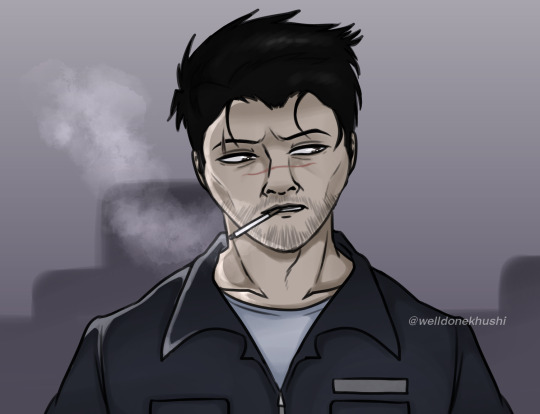
NEW DESIGN:
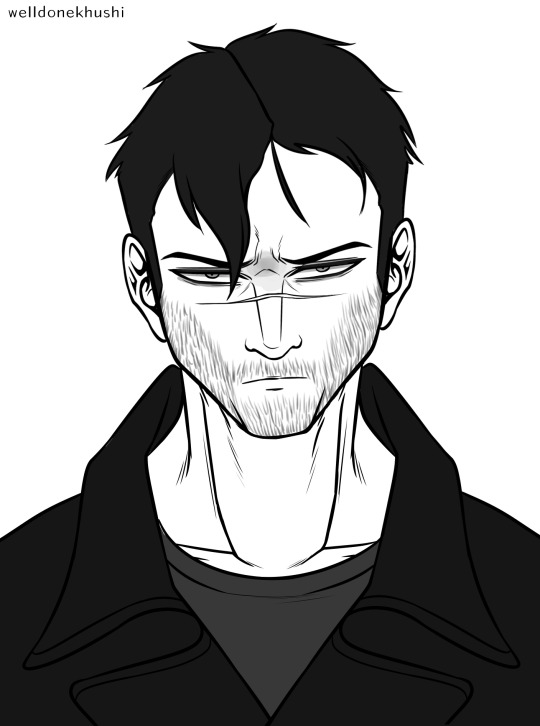
Finally, I came up with my Bell's bio-sheet as well! I abandoned him for nothing, but now I decided to give him some depth and character for good <3
BLACK OPS 6
GENERAL:
Name: Vasili
Full name: Vasili Mikhailovich Sokolov/Vincent Stephens
Codename: "Bell", Ворона (The Crow, by the KGB)
Alias(es): Vasya, Vince, Vasen'ka (by his parents), Adler's protégé (by Woods), Scary Old Man (by Sims), Major Sokolov
Age: [REDACTED]
Gender: Male
Nationality: Soviet (as Vasili), American (as Vincent)
Languages spoken: Russian, English, Spanish, Italian, German and fluent in many other languages
Date of Birth: [REDACTED]
Place of Birth: Kamyshin, Russian SFSR
Sexuality: Heterosexual
Marital Status: Single
Occupation: KGB (retired), Perseus Operative (formerly), MACV-SOG (currently, but after the true ending he leaves)
Status: Unknown
Universe: Black Ops: Cold War
Faceclaim: Danila Kozlovsky

Song: "Ostrov Nevezeniya" by Andrei Mironov
youtube
Biography: Bell, unaware about his own existence and his past, sought to assist the CIA special agent, Russell Adler on the aim to hunt down Perseus. Every moment that passes, he starts gaining his lost memory back, which makes him question himself about what he truly is. Would Bell choose the right side of history, or choose his own?
Get to know about his parents too!
AFFILIATIONS:
KGB (Committee for State Security)
General Anton Charkov
Major Dimitri Belikov (double agent)
Major Vadim Rudnik
Lev Kravchenko
Perseus Faction
"Perseus" (leader)
Arash Kadivar
Anton Volkov
Qasim Javadi
The Safehouse
Alex Mason
Frank Woods
Russell Adler
Helen Park
Lawrence Sims
Lazar Azoulay
Aleksandra "Aleks" Clarke R. (@alypink)
Yume Sieheart (@cyberghostdraws)
Koa "Hunter" Nikau (@islandtarochips)
Charles Moore (@deeptrashwitch)
SKILLS AND ABILITIES:
Weapon induced: Knife, MI6A1, M60, MP5, Type 63, LW3 — Tundra, AK-47, Throwing Knife
Fighting style: Systema, hand-to-hand combat, a little martial arts
Special skills: Has a good sense of observation and quick to react to the situation, can compose himself in many identities
Talents: Vasily could learn languages easily at a fast rate, even after getting brainwashed, he still retained those qualities within him
Shortcomings: Has frequent headaches, loses focus at times, not very confident when it comes to taking a decision, becomes absolutely dependent on his superiors
MOODBOARD:
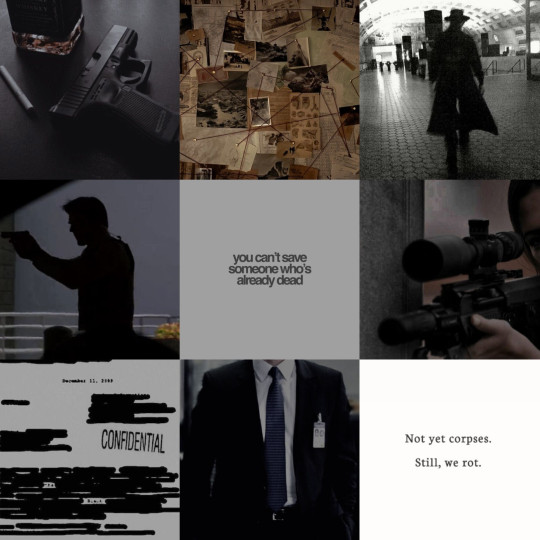
PERSONALITY:
Myers-Briggs Type: ISTP (The Virtuoso)
Is aware of his surroundings: Because of his career as a special agent, Bell conceals himself in terms of his personal life in seclusion. Even knowing he's hunted everywhere, he intelligently makes himself invisible from the outside world which makes others difficult for him to locate or recognise.
Works in solitude: Vasili/Bell has always prefered to work alone, but it doesn't mean he doesn't mind going on missions with the team. But, as his habit of being a special agent, that trait normally came from him back in his days when he worked with the KGB.
Observant and intelligent: Vasili was able to survive any sort of situation because of his good observant skills, and his capacity to act quicker. He was able to learn a lot of languages as well, and posed himself in different identities, that made it harder for the intelligence agencies to track him down.
Is reserved and introverted: Bell really doesn't speak to anyone much, unless when it comes to planning or going for missions, he needs to form a sort of communication to keep it lively. He is seen being more comfortable with Mason and Woods, but never felt having a good vibe with Adler. It was odd on his part, but it was going to grow very obvious when the truth would have come closer to any minute.
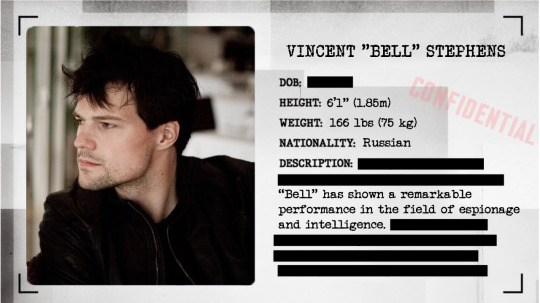
BACKGROUND STORY
Bell, who first used to live under the identity of Vasili Sokolov, was born in a family who had an army background, where his mother and father, both served during the Second World War, and hearing their stories, it gave Vasili a motivation to support his parents legacy by joining the intelligence — which was the KGB, going under the codename "Crow".
THE KGB ARC [REDACTED]
When Vasili joined the organisation, he showed a remarkable performance as a special agent. Some say he was born to join the intelligence and make the country proud, or he was a gifted child who could learn anything quickly and successfully perform a mission by stealing info or destroying any plans that could harm his country, without any failure. He even pointed out possible mistakes while planning out a mission, and in the end they worked out efficiently. Alongside, he made himself a friend, whose name was Dimitri Belikov, and grew closer to each other and worked together as a team.
Sooner or later, Vasili's influence spread all around the world, especially during the Cold War, the enemies of the Soviet Union had a kill/capture on him. "Kill" because Vasili knew too much about them, and "Capture" because, they wanted him to tell everything he has with him, which likely created a risk for the KGB and they couldn't do so. With that, General Anton Charkov gave him the order to "retire" and stay hidden to protect himself along with the organisation. Disappointed, Vasili protested that it was the only thing that "kept him going", but having no choice, the agent decided to leave the KGB, under the General's orders.
PERSEUS ARC [REDACTED]
It was a matter of time, when one was going to collect him instead, realising he was now no longer affiliated with the KGB. Vasili was met with someone who called himself "Perseus", and requested him to join his alliance, since he knew about Vasili from his influence, and promised to give him full security, knowing he was hunted worldwide too. Seeing that as an opportunity, Vasili agreed to join in good terms, directly becoming Perseus's loyal agent.
As he continued his journey in the faction, he had shown his skills again which made Perseus as his most trusted agent, unlike the rest. But, at times Vasili has shown inner conflict towards his ideas. During the moment when he was explained about "Operation Greenlight" with the members, it left a strange feeling within his heart. He tried to protest, but he somehow couldn't refute his superior's words, and decided to acknowledge instead. Vasili had kept showing a remarkable performance, much to Arash Kadivar, one of the faction members, being envious of his relationship with Perseus.
Kadivar lures him to Trabzon Airport, where he takes Vasili, and explains that he didn't want any more "competition", resulting in him shooting the special agent in the car he was present in, leaving him to die and bleed alone. But, sooner or later, an attack situated on the airfield, unbeknownst to the dying Vasili who was growing unconscious every passing minute. Growing lost in his own thoughts, about Perseus that promised him to give him protection from the outer forces, but didn't recognise that his "own" people were against him too, as he questioned his existence at the same time.
SAFEHOUSE ARC
The voices echoed, and the man started to lose his breath.. until he woke up, and found himself in a strange place, where he couldn't remember anything of what happened. This is where, he encounters Russell Adler, a CIA agent who he curiously looks upon, having no idea. Unable to introduce himself, Adler briefed him about his name, being it under the codename "Bell". And this is where, all the very events of the canon game begin from here.
#cod#call of duty#bocw#black ops#call of duty black ops#black ops cold war#cod bell#bell oc#vasili sokolov#call of duty oc#oc#original character#oc biography#original character profile#character profile#my oc#my oc character#vasili bell sokolov
123 notes
·
View notes
Text
So, why Shostakovich?
That's what I wondered, watching Aziraphale in Maggie's record shop.
Shostakovich is a rather recent composer for Aziraphale to listen to - I mean, he regards Glenn Miller as modern. I would have expected him to get something that's a more obvious choice - maybe one of the composers Crowley mentions early in S1? That would have been a nice nod to that scene. Why Shostakovich? So I read up on the man, and then I understood.
Because Shostakovich was a Soviet-era composer, and came into conflict with the regime more than once.
In 1936, his career took a massive hit after a campaign against one of his works, because the music was viewed as "deliberately dissonant" - it didn't conform to some people's idea of of what Soviet music should be like. He did not strictly adher to their narrow ideals and felt the consequences. (And he was lucky. He had friends and family who were killed during the Great Terror, which started around that time.)
This forced him to try and adept and eventually his career recovered.
He was denounced again 12 years later, during a wider campaign against Western influences on Russian music. He had to apologize, many of his works were banned and he and his family lost privileges.
In 1960, Shostakovich made a controversial decision: He joined the Communist Party. It is unclear why he did this, whether it was fear, political pressure or indeed his own free choice - though reportedly he was in tears afterwards and told his wife about having been blackmailed.
So we have a composer whose work was repeatedly marked as non-conforming to the regime he lived under, not living up to some arbitrary, propagandistic standard, even after he tried to adapt his style. And we have an angel who never quite fit in with Heaven, whose approach to the world and his work were seen as silly at best, who was admonished for the way he used miracles and eventually declared a traitor.
We have a composer who, for one reason or another, ended up joining the party that had punished and humiliated him in the past. And we have an angel who ends up going back to Heaven.
I get why Shostakovich was an obvious choice, after all. What I can't get over is the implication that WE WERE TOLD AS EARLY AS EP 1 THAT AZIRAPHALE WOULD REJOIN HEAVEN!?? EVEN THOUGH IT WOULD MAKE HIM SUFFER AND MIGHT NOT BE AN ENTIRELY VOLUNTARY DECISION EITHER?? The audacity (I love it) to put that out there right from the start, for everyone to see who only cared to look, when none of us would be paying too much attention to it on the first watch.
#it's so obvious really#I mean I got all this from a ten minute scroll through Shostakovich's Wikipedia entry#it's right there#Good Omens#Aziraphale#Dmitri Shostakovich#Shostakovich#meta
279 notes
·
View notes
Text
DR. STEFANIA TURKEWICH // COMPOSER
“She was a Ukrainian composer, pianist, and musicologist. She is recognised as Ukraine’s first woman composer. She studied under multiple composers and musicians from 1914 til 1933. In 1933, she taught piano and became an accompanist at the Prague Conservatory and the year after, she defended her doctoral dissertation on the topic of Ukrainian folklore in Russian operas. She received her doctorate in musicology in 1934 and became the first woman from Galicia to receive a Doctor of Philosophy degree. She worked as a teacher of musical theory and piano at the Lviv Conservatory and became a member of the Union of Ukrainian Professional Musicians. She fled from the Soviets after the war, moving to southern Austria and then Italy, and then the UK (where she returned to composing).”
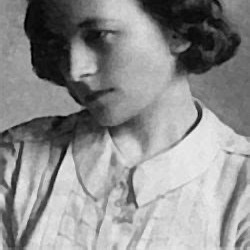
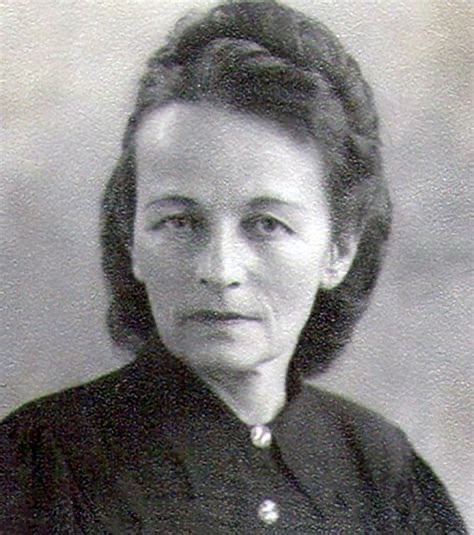
51 notes
·
View notes
Note
Did the Soviet union ever shared anything from its archives before Yeltsin? Did they share it with other socialist states?
Like any government archives, the archives of the Soviet Union were not solely composed of sensitive classified information. What the Russian Federation under Yeltsin did was begin a process to declassify large swaths of previously classified information, especially historical information, just as the Soviets had done to the records kept by the imperial government before them. But of course, there were times during the Soviet period where information was made public that was previously classified, particularly during glasnost. And of course, between allied governments information was shared when it was prudent. It all depended on what the information was.
There is still information from the Soviet era that remains classified by the Russian Federation, so it should be emphasized that the archives were not made public completely. However, those still-classified records mainly pertain to living persons and geographical data and other sensitive information that must be handled on a case-by-case basis, and there is no reason to believe there are still hidden documents that would prove Stalin really did commit genocide or any nonsense like that. If such information existed, Gorbachev and Yeltsin would have made it public in the 90s.
26 notes
·
View notes